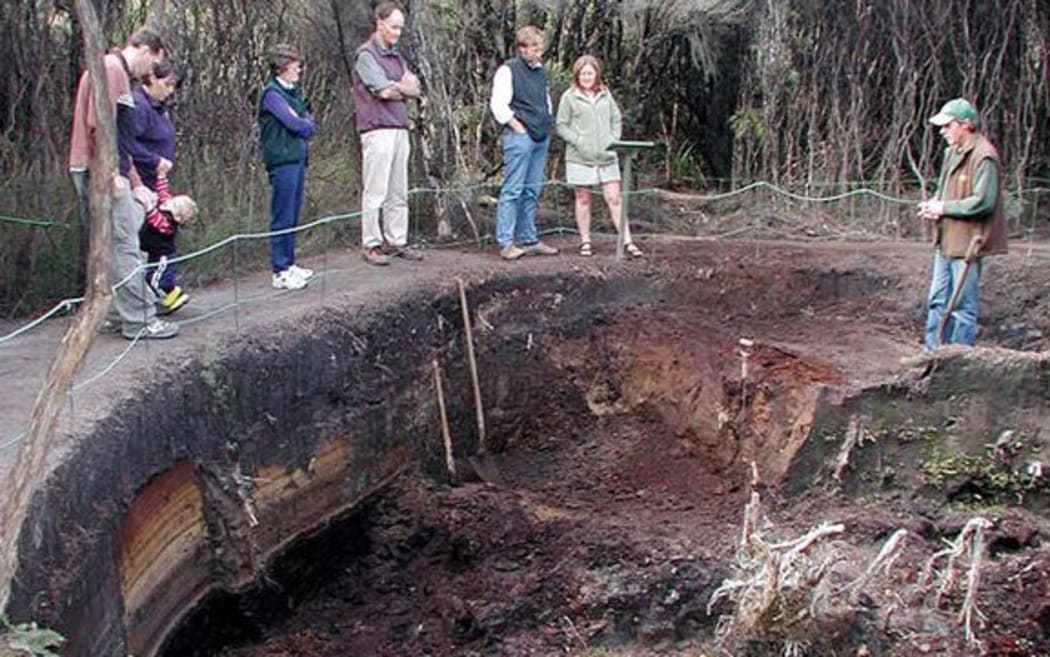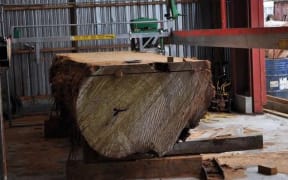A Far North conservation group has raised the alarm over a recent resource consent allowing a tourism operator to dig for swamp kauri.
The Northland Regional Council approved an application in January, by the owners of Gumdiggers Park, north of Kaitaia, to dig up indigenous wetland.

A file photo showing the extraction of ancient kauri Photo: Ancientwood
The 27 hectare park is one of the few pieces of former gumfield land around Awanui that has not been cleared and turned into pasture or orchard.
Owners John and Sharon Johnston have spent the last 15 years turning it into a tourist attraction.
Mr Johnston said the property had been in his partner's family for a century, and 90 percent of it was in its natural state - mainly regenerating manuka.
"Basically the site was part of my partner's family's farm. Her great grandfather Patrick Heath was one of the first Irish settlers in the Far North and he started digging kauri gum here in about 1890."
On part of their block, the Johnstons have built a replica kauri gumdiggers' village, bred geckos with Department of Conservation approval and built viewing platforms for a giant kauri, uncovered in a large pit.

Tourists at Gumdiggers Park Photo: Supplied
The site attracts thousands of visitors a year, including school groups and scientists keen to see what the ancient buried trees can tell them about past climates.
NIWA believes the trees on the property could be among the oldest in the world.
Now, the Johnstons want to prospect for more ancient trees to expand their venture.
They have proposed digging up about half a hectare of land over a 10-year period, replacing soil and replanting manuka as they go.
They have done it before, and said it took four years for the vegetation to bounce back.
'Consents to drain and destroy'
Digging up indigenous wetlands is not prohibited in Northland. The regional council classes it as a non-complying activity, which means it can be done, subject to resource consent.
The council has granted the Johnstons resource consent to dig - on the basis that the impact on the land will be less than minor.
Council consents manager Colin Dall said the couple had a good track record in restoring land they had dug in the past.
"They're proposing the same type of restoration of areas they're not going to use for viewing pits, and that means they will stockpile soil and vegetation and replace it as they go," he said.
But the resource consent has outraged the Northland Environmental Protection Society.
It said the regional council's rules were at odds with the Resource Management Act (RMA), which said wetlands should be preserved.
The group's president, Fiona Furrell, said the Johnstons' resource consent showed last year's review of swamp kauri extraction rules, by the Ministry for Primary Industries, had done nothing to protect wetlands.
She said the council was approving more swamp kauri extraction than ever.
"They're simply not complying with New Zealand law," she said.
"Their rules aren't up to date; they don't comply with the RMA and they're issuing consents to drain and destroy the very few wetlands we now have left in Northland."
But Mr Dall said that was not the case.
The regional council had a list of what it considered to be the top 150 wetlands in the north and no resource consents had been issued for swamp kauri extraction in any of them, he said.
Gumdiggers Park did not make the top 150, he said.
The way Mr Johnson saw it, his wetland was drained 100 years ago by the gumdiggers who broke through the hard pan and drained the perched water-table that sustained it.
The Northland Environmental Protection Society has asked the High Court for a judicial review of the way government departments enforce the law on swamp kauri extraction, and the case will be heard in June.



